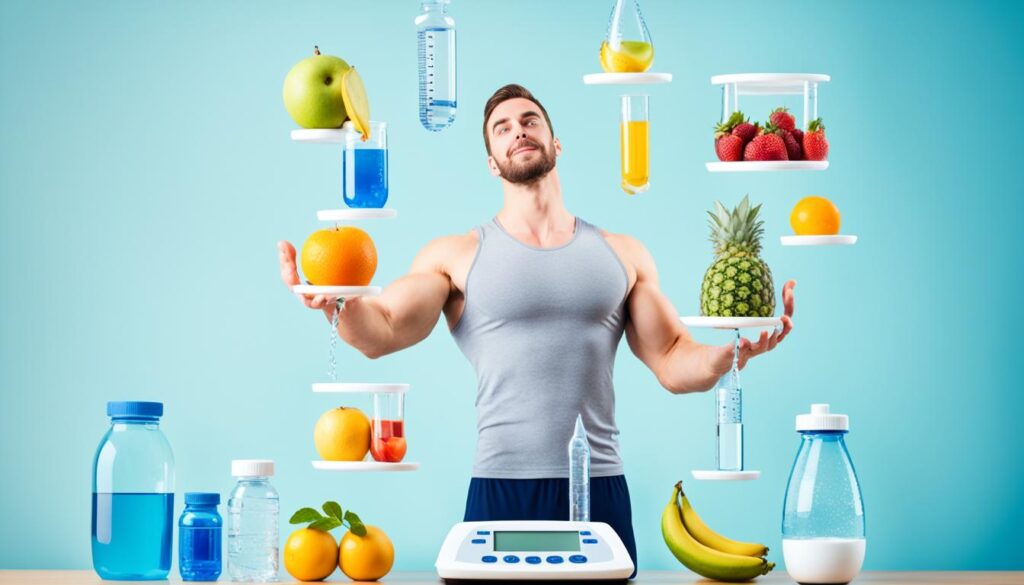The quest for health and vitality often overlooks a fundamental component readily available at our fingertips—water. A proper water diet goes beyond the occasional sip to a strategic consumption plan tailored to our body’s needs. The health benefits of drinking water are vast, touching every aspect of our well-being from the inside out. Staying hydrated is more than a mere health tip; it’s a necessity for maintaining bodily functions and ensuring our cells thrive in an optimal environment.
From cushioning joints to aiding in digestion, the importance of water in diet is irrefutable. Yet, many find themselves neglecting their hydration needs, leading to a plethora of preventable health issues. By integrating hydration tips into daily routines, individuals can enjoy the benefits of a balanced water diet—ensuring they stay fluid, focused, and fully alive.
Key Takeaways
- Water is a pillar of health, essential for metabolic processes and organ functions.
- Hydration aids in waste elimination, maintaining normal temperature, and protecting tissues.
- A proper water diet helps prevent dehydration and its related energy depletion.
- Individualized hydration tips can lead to long-term wellness and enhanced daily performance.
- Recognizing the importance of water in one’s diet is paramount for holistic health.
Understanding Hydration and Its Key Role in Health
The significance of proper water intake is deeply rooted in the physiological basis of hydration, a cornerstone of human health. Like a ripple on the surface of a pond, the importance of water in a diet extends through the complexities of our biological systems. Essential for the continuity of life, water facilitates the homeostatic functions necessary for a well-functioning body and a sharp mind.
Physiological Basis of Hydration and its Importance
Water, a marvel of simplicity and necessity, is the medium through which cellular processes find momentum. At the cellular level, water acts as a transporter of nutrients, regulates body temperature, and maintains osmotic pressure, which is vital for all physiological activities. Implementing healthy hydration tips can amplify the overall vitality and process of life, showcasing water’s pivotal role in our daily existence.
Monitoring Hydration Status: Signs of Proper Hydration
To navigate the journey toward optimum hydration, one must learn the landscape of monitoring hydration status. The body communicates its needs through various signs of proper hydration, including but not limited to the frequency of thirst and the clarity of urine. A pale straw hue and minimal thirst are the hallmarks of a hydrated state, creating a balance where the body needs not whisper its necessities.
| Indicator | Sign of Adequate Hydration | Sign of Dehydration |
|---|---|---|
| Thirst | Rarely felt | Often or intense |
| Urine Color | Colorless or light yellow | Dark yellow or amber |
| Skin Turgor | Snaps back quickly when pinched | Remains tented or slow to return |
| Mental Alertness | Sharp and focused | Dulled or fatigued |
Effects of Dehydration on the Body and Cognitive Function
Despite water’s abundance, the effects of dehydration are a far too common affliction, with consequences that stretch beyond a mere dry throat. As hydration levels drop, so too does our physical prowess and cognitive function, leaving us listless and struggling to perform tasks that once came easily. Consistent and adequate hydration ensures the machinery of the body operates smoothly, fortifying us against the creeping lethargy of dehydration.
- Physically, dehydration can lead to complications such as kidney stones and urinary tract infections.
- Cognitively, even mild dehydration can impair concentration, memory, and mood.
- Overall, proper water intake is akin to oil in an engine, necessary for optimal performance and longevity.
Through this exploration of hydration, we observe the benefits of drinking water as an integral component to health. Thus, attention to fluid intake is not merely an act of self-care—it is an essential chapter in the narrative of our well-being.
What is a proper water diet?
At its core, a proper water diet transcends the act of drinking water on an as-needed basis; it’s a deliberate approach to hydration that tailors fluid intake to an individual’s specific needs. To demystify the question, what is a proper water diet, it’s essential to consider the unique physiological hydration requirements that vary based on lifestyle, health, and even climate exposure.
Integral to a functional water diet plan, the consumption of beverages and hydrating foods should coincide with the natural loss of body fluids through metabolic processes. While water is the centerpiece of such a diet, other liquids and water-rich foods play a supportive role, contributing to the body’s complete hydration. Individuals exploring a water cleansing diet often emphasize the purity of water intake, focusing on this clear elixir to help cleanse the system and support detoxification pathways.
A harmonious blend of quantity and quality, the proper water diet plan includes various hydration sources. These may range from the foundational H2O to herbal teas and infusions, extending even to fruits and vegetables high in water content, such as cucumbers, celery, and watermelons. It’s not just about the fluids; it’s about how these elements synergize to promote comprehensive wellness.
“Consistent, mindful hydration is not an act but a habit, becoming a part of one’s daily rhythm essential for optimal health.”
- Varied Hydration Sources: Expands beyond water to include other hydrating beverages and foods.
- Individual Tailoring: Adjusts fluid intake based on personal lifestyle, health status, and climate.
- Consistency: Emphasizes regular intake throughout the day to replenish fluids lost naturally.
- Purity of Intake: Encourages drinking clean, pure water as part of a detoxifying regimen.
To gauge the effectiveness of a water diet plan, individuals can monitor indicators such as skin elasticity, urine color, and overall physical and cognitive vigor. The pursuit of a proper water diet is not just about quenching thirst but fostering a lifestyle wherein every sip is a step toward holistic health.
Calculating Personal Water Intake for Optimal Health
Understanding how much water to drink to stay properly hydrated is crucial, especially considering the vast differences in individual water needs. Knowing your daily water requirement is pivotal to maintaining health, as it supports numerous bodily functions and performance in sports. Let’s explore the myriad factors that affect hydration and learn how to tailor a personal hydration strategy.
Factors Influencing Daily Water Requirements
Your individual water intake hinges on several variables that make a one-size-fits-all approach impractical. These include physiological factors like age and weight, lifestyle aspects like exercise frequency, and environmental conditions. Even at rest, your body is constantly losing water—breathing, sweating, and eliminating waste all contribute to your overall water needs.

Adjusting Water Intake for Physical Activity and Climate
Whether engaged in hydration in sports or simply exercising, it’s essential to increase your water intake to compensate for the additional loss of fluids through sweat. And it’s not just about quenching thirst post-workout; pre-exercise hydration plays a fundamental role in performance and recovery. Similarly, the climate impact on hydration cannot be underestimated. High temperatures and humidity levels mean your body works harder to stay cool, leading to increased fluid loss and a higher risk of dehydration.
Understanding and Assessing Individual Hydration Needs
Successfully assessing hydration needs involves more than paying attention to the dryness of your mouth or the frequency with which you feel thirsty. Utilizing metrics such as urine color—a pale, straw hue indicates proper hydration—and considering your energy levels and cognitive function can provide a more accurate read on whether you’re meeting your daily water requirement. Creating a personal hydration strategy means adapting to peripheral factors and listening to your body. Remember, maintaining a state of staying hydrated is an ongoing process and is critical in promoting optimal health.
Incorporating these insights in your routine can ensure that you’re drinking the right amount of water, thus optimizing your health, enhancing your physical performance, and honing your mental sharpness. Hydration, after all, is a key ingredient in the recipe for a vibrant and energized lifestyle.
Benefits of Drinking Water and Incorporating a Water Diet Plan
Water is an essential component of life, influencing both immediate effects of hydration and long-term health. Let’s delve into the transformative impact of incorporating a water diet plan into daily routines and discover how it can elevate our health and enhance physical performance.
Immediate and Long-Term Health Benefits
The drinking water benefits are manifold, beginning with its role in immediate hydration. It aids in waste disposal, regulates body temperature, and maintains joint health. Over time, this essential liquid supports long-term health by mitigating chronic illness risks, enhancing mental functions, and fostering overall wellness. Engaging in a water diet for weight management is not just a lifestyle choice but a preventive measure for holistic well-being.

Water as a Key Nutrient for Weight Management
Integral to weight management efforts, water acts as a key nutrient, managing calorie intake and assisting in metabolic processes. It’s pivotal within water diets for weight control, underscoring its importance in achieving a healthy body. By acting as a natural appetite suppressant and assisting in metabolizing stored fats, water aids in weight loss and prevents obesity, proving essential in a balanced lifestyle.
Enhancing Physical Performance Through Hydration
When it comes to hydration physical performance, the benefits of a water diet plan are clear. Adequate water intake is crucial for maintaining endurance, reducing oxidative stress, and effectively managing body heat during physical endeavors. For those engaged in athletics, understanding the importance of athletic hydration and tailoring your water intake to match exercise intensity can significantly boost performance levels.
- Hydrated athletes experience better joint lubrication, reducing the risk of injury during performance.
- Implementing hydration strategies may alleviate the physical stress of training and aid in faster recovery.
- A well-hydrated state optimizes cardiovascular function and energy efficiency.
Conclusion
As we draw this discussion to a close, it is evident that the importance of water in diet cannot be overstated. Maintaining healthy hydration is not merely a beneficial health practice; it is the cornerstone of a thriving physiological ecosystem. A wide array of water diet benefits emerge when individuals align their intake with the body’s intrinsic needs—ranging from bolstered cognitive sharpness to enhanced physical vigor.
The water diet is not a transient trend but a lifestyle commitment that bears fruit in all facets of well-being. Recognizing the personal requirements for hydration and addressing them accordingly is an investment in one’s health that pays dividends in immunity resilience, disease prevention, and the dynamic energy to savor life’s activities. This underscores maintaining healthy hydration as a catalyst for comprehensive wellness and an ally in the quest for longevity and vitality.
In the panorama of nutritional practices, the water diet stands out as a universally needed regimen. To that end, we embrace a fluid balance that suits our unique lifestyles, ensuring that every sip is a step toward optimal health. As we navigate daily routines and face myriad challenges, let’s remember to uphold the vital habit of hydration—a fundamental gesture of self-respect and a testament to the importance of water in diet.




